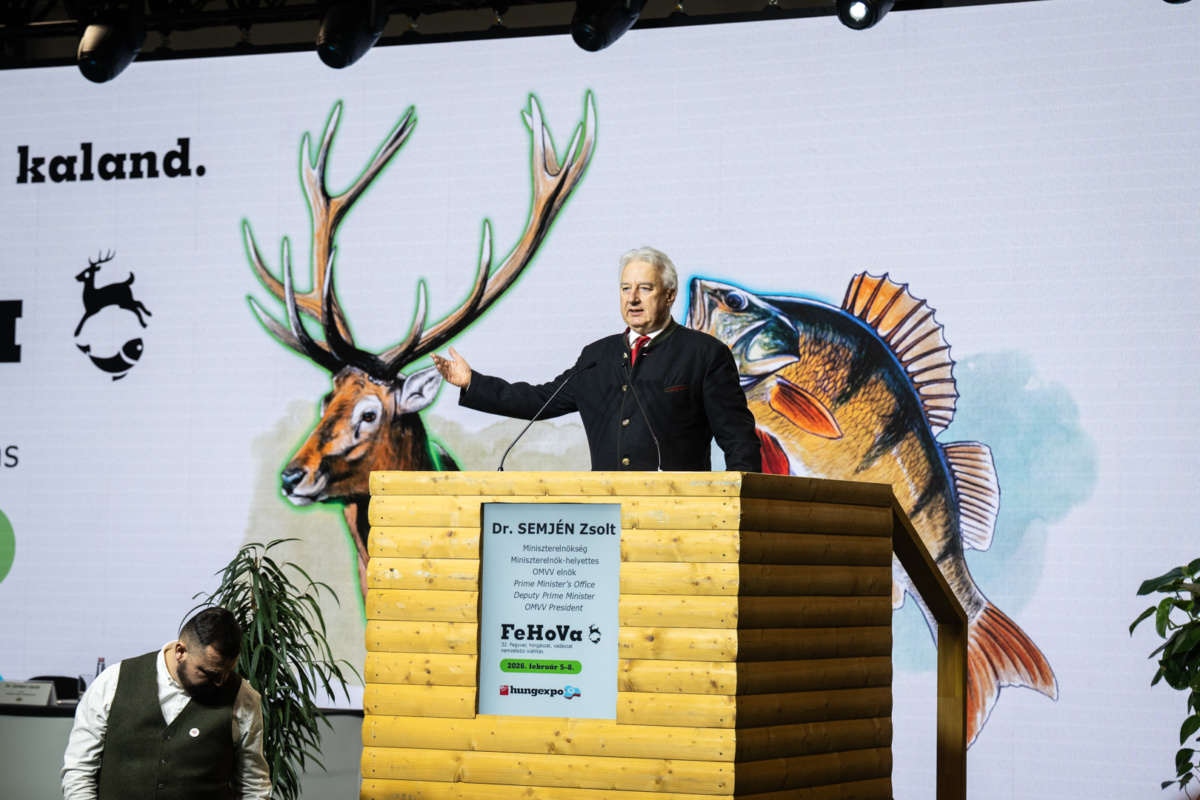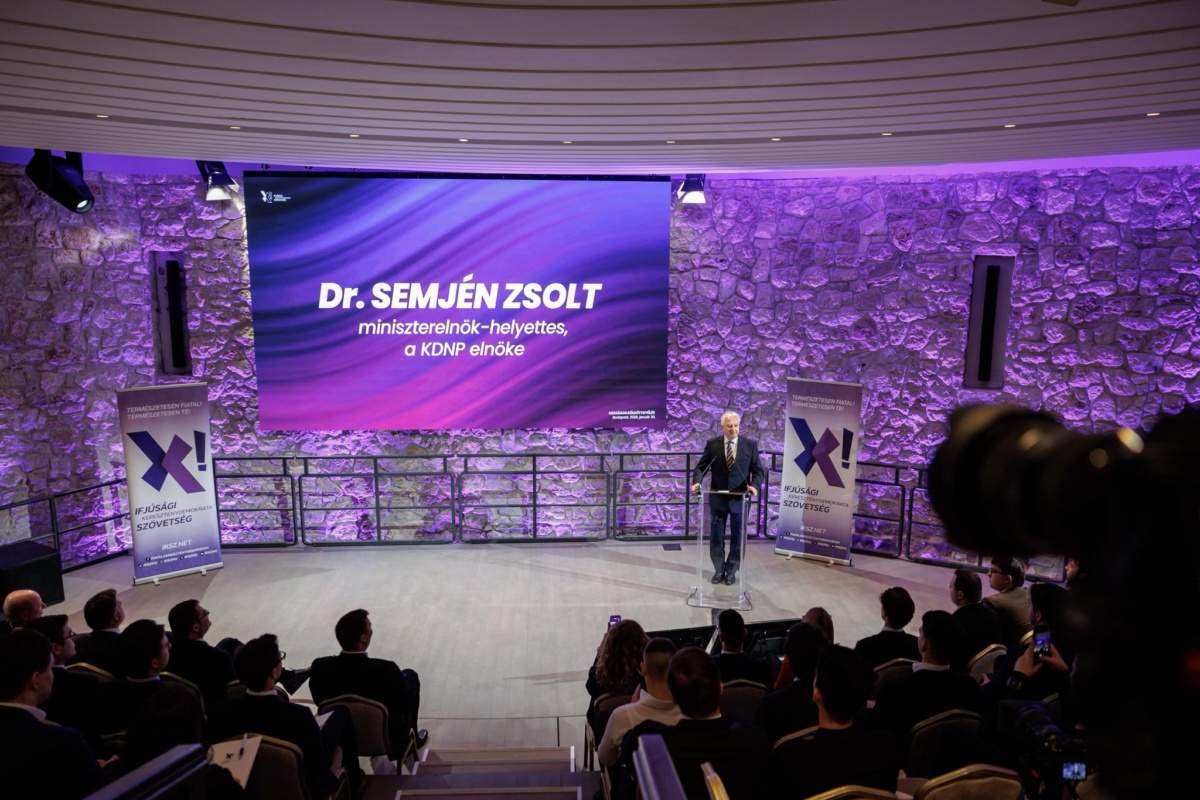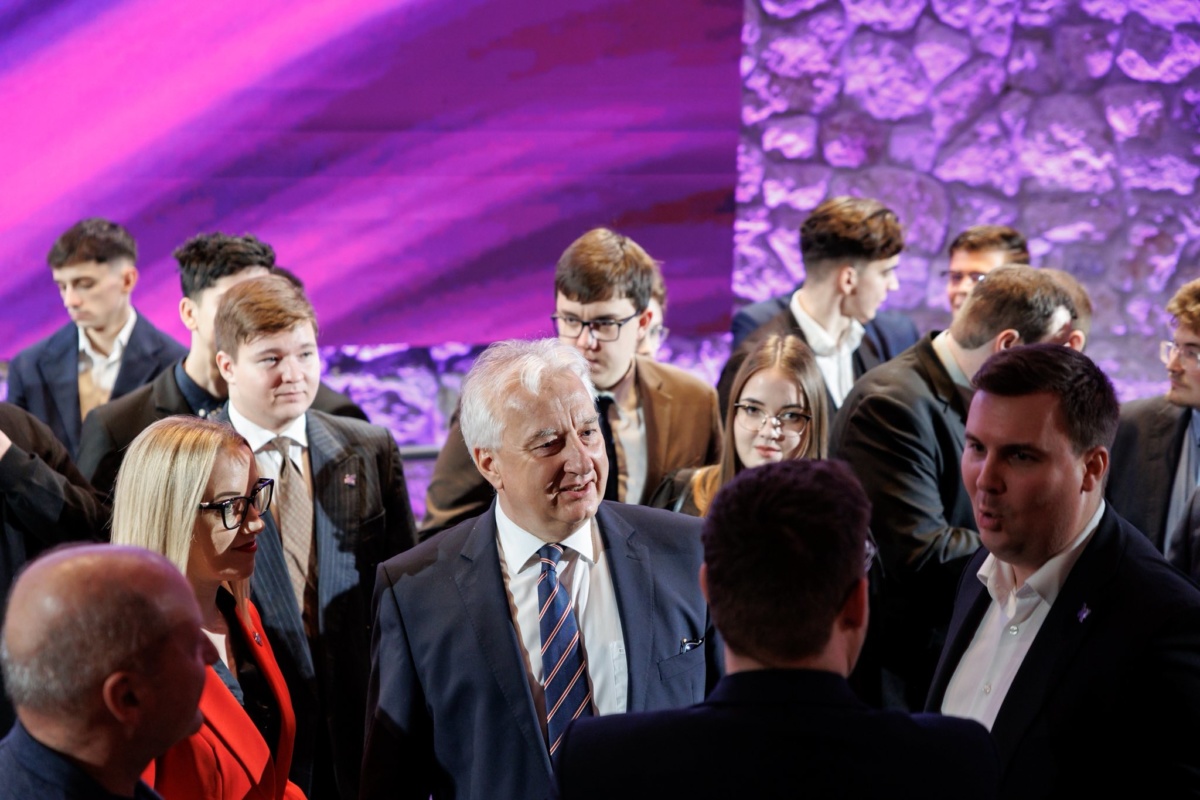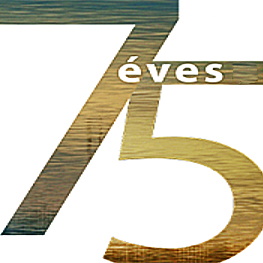Zsolt Semjén was born in Budapest on 8 August 1962. On his father’s side he is descended from a noble family from Upper Austria; on 5 August 1590 the Holy Roman Emperor Rudolf II awarded one of his ancestors a full grant of arms and privileges in recognition of his display of bravery in the Ottoman wars. His paternal grandfather was the railway station master at the Gyékényes border crossing, and his grandmother came from a mill-owning family in Somogy. His mother’s family fled Transylvania after the Second World War, but at the border the Romanian authorities arrested his grandmother, imprisoned her and confiscated her property. His father, Miklós Zoltán Semjén (1929–2007), was head doctor at a clinic in Budapest’s District II, where his mother, Erzsébet Niklász (1932-2022), worked as an X-ray assistant. His brother György (born 1951) is a mathematician who for some decades has lived in Stockholm.
He met his wife, Erzsébet Gabriella Menus, when they were still in high school, and they married in 1988. She is a graduate of the Liszt Ferenc Academy of Music, a singing and music teacher at the Franciscan Szent Angéla Elementary and High School, a choral conductor and a church musician. They have three adult children, who now live independently: Emese Borbála (born 1991) is a graduate of the Faculty of Law and Political Sciences at Pázmány Péter Catholic University; Botond Benedek (born 1994) graduated from the Faculty of Business Administration at Corvinus University of Budapest; and Álmos Ágoston (born 1996) is a graduate of the Faculty of Architecture at Budapest University of Technology and Economics.
He completed his elementary and secondary education in Budapest, graduating from Szilágyi Erzsébet High School in 1981. Until 1984 he worked as an office assistant at the Small-scale Production Corporation in Budapest. In the years preceding the fall of communism, he was a lay student at the Pázmány Péter Roman Catholic Theological Academy, and in 1991 he received his doctorate in theology. In 1989 he was awarded a baccalaureate, in 1990 a licentiate and in 1991 a doctorate. At the same time he was a student at the Faculty of Humanities of Eötvös Loránd University, where in 1992 he obtained a degree in sociology. In 1993 he was a research fellow at the Jesuit Collegium Hungaricum in Leuven, Belgium, where he studied theology and social sciences. In 1994 he studied law in Budapest, and in 1996 he was appointed honorary docent at Pázmány Péter Catholic University. In 1997 he received his PhD, with a dissertation on the sociology of religion. Since 2011 he has been an honorary professor at Óbuda University, and in 2021 he was awarded the title of Academic Freeman the University of Sopron.
His speeches in Parliament and other speeches on policy, his talks on politics and Christianity, his addresses at memorial events and interviews have been published in a number of individual volumes: Igenis szólnunk kell! (“Yes, We Must Speak Out!”, 2000); Egyházpolitika (“Church Policy”, 2003); Ius Resistendi (“Right of Resistance”, 2007); Egyenes úton (“On a Straight Path”, 2008); Megharcolunk minden magyarért (“We Fight for All Hungarians”, 2011); Nemzetpolitika (“Policy on Hungarian Communities Abroad”, 2012); Két pogány közt (“Between Two Pagans”, 2013); Egymillió (“One Million”, 2017); Földön és égen (“On Earth and in Heaven”, 2018); Az örök magyarság küldetésében (“Serving the Mission of Eternal Hungarian Identity”, 2021); A józan ész ellenforradalma (“The Counter-Revolution of Common Sense”, 2024). His works are published by the party foundation named after István Barankovics, by the Saint István Society of the Roman Catholic Church, and – more recently – by Antológia Publishing House, which was founded by Sándor Lezsák. The permanent editor of his volumes wrote the following: “These books – Christian democratic homilies, national sermons – are, sub specie aeternitatis, a political avowal of faith. The work of Zsolt Semjén’s political life is the building of the country and the nation, which is something which has been physically achieved under the governments he has been a member of. All of this is enduring because the spirit that underpins it – and that acts like a ground plan – is permanent. It is politica christiana [Christian politics] that is rooted – deliberately and consistently – in the Eternal. Therefore, in the sight of God in Hungarian history, it is permanent amidst the impermanence of politics.” Legeza Publishers published his poems written in the early 1980s under the title Megsejteni a sejthetetlen (“Perceiving the Imperceptible”, 2018), and with Zsolt Bayer he wrote a book entitled A vadászat választott engem (“Hunting Chose Me”), which was published by Dénes Natur Műhely and introduced to the general public at the Agricultural Museum in Budapest on 12 January 2022.
His thinking was greatly influenced by the papal social encyclicals, and encouragement from his theology professors (above all Pál Bolberitz) played a major role in his entering public life. In 1988, following an invitation from Sándor Keresztes, he joined the Márton Áron Society. In 1989 he founded the Christian Democratic People’s Party (KDNP). Since 1991 he has been a member of the Executive Committee as chairman of the National Disciplinary and Ethics Committee. He sought to stay out of the party infighting which characterised the period between 1994 and 1997, and by promoting diverse views he sought to prevent a final split. The wider public was already regarding him as the party’s future leader when he became its vice-president in 1997. After the KDNP moved away from the Christian democratic tradition and was expelled from the European organisation of Christian and conservative parties, he suspended his membership without resigning; despite this, he – together with several other fellow politicians – was expelled as a “liberal”. As one of the founders of the Barankovics platform, he joined the Hungarian Christian Democratic Alliance. After several years of litigation he was re-elected party vice-president in 2002 and then, on 28 June 2003 (after the death of László Varga), he was elected president; on 8 December 2024 he was re-elected unopposed for a sixth term – this time for five years. According to its political programme, his party seeks to operate within the framework of the Fidesz-led Civic Alliance, but as a credible and distinctive ideologically-based party with an independent political image, maintaining organisational autonomy. The first political alliance agreement with Viktor Orbán (President of Fidesz), signed in 2006, was extended on 4 May 2010. Under the terms of this, Christian Democrat politicians stand as candidates in individual constituencies and on joint party lists, and agreed parliamentary work continues within the framework of the parliamentary group alliance. As party president he is proud to have succeeded in reviving the KDNP.
He is a politician who participated in the defeat of communism in Hungary. In 1990 he stood as a parliamentary candidate for the Buda Castle District constituency, and later became head of office, secretary and press spokesman of the parliamentary group of the KDNP, which was a partner in the governing coalition. Through his party’s list, in October 1990 he became a local councillor and council group leader in Budapest District II. In the 1994 general election he again stood in the Castle District (Budapest voting district 1), but was elected to Parliament through the party’s national list. From 1994 onwards he was clerk of the legislative body and a member of the Social Affairs and Healthcare Committee, and from 1995 deputy leader of his party’s parliamentary group. After the dissolution of the parliamentary group (on 22 July 1997) he became an independent, that November joining the parliamentary group of the Hungarian Democratic Forum (MFD), and in December taking a place on the Standing Committee on Human Rights for the first time. While still in opposition, he proposed that the law should make state recognition of religious organisations as churches conditional on presence in Hungary of at least one hundred years or a membership of at least ten thousand. In 1998 he was an MDF-supported candidate in the Pásztó constituency (Nógrád County voting district 2), but the MDF’s recent election failure prevented him from winning a seat – even as its party list leader in Veszprém County. Between 1998 and May 2002 he was the civic coalition government’s Deputy State Secretary for Church Affairs at the Ministry of National Cultural Heritage. During this period he organised an international church summit in Hungary, resolved disputes with the Holy See, restored state funding for faith education, concluded an agreement with the historic churches, and arranged for the equitable funding of church institutions providing public services. He also played a role in the Holy Synod of Constantinople’s recognition of King Stephen I as a saint. This is considered the greatest success of Hungarian ecclesiastical politics, because King Stephen is the only saint to gain recognition by both Eastern and Western Christianity since the Schism of 1054.
In 2002 he returned to Parliament with a seat won through the joint national list of Fidesz and the MDF. Throughout the parliamentary term he was Vice-chairman of the Committee on Human Rights, Minority and Religious Affairs. As a Member of Parliament he saw his most important task as being to ensure the freedom of churches, which is why in Parliament he questioned the Interior Minister and asked public questions to urge for the remuneration of religious teachers and for support for the Association of Christian Intellectuals.
Due to the withdrawal of a Fidesz candidate, at the last minute and without any planning he entered the running in the 2006 general election to represent the constituency of Kalocsa (Bács-Kiskun County voting district 7) – a town which is a thousand-year-old Catholic archiepiscopal centre. In the first round he gained a significant lead over the Socialist (MSZP) candidate, and his victory was not in danger even after Kalocsa’s liberal mayor subsequently withdrew in favour of the MSZP. He was also in fourth place on the national list jointly drawn up by Fidesz and the KDNP. As co-chair of the Parliamentary Group Alliance for Hungarian Solidarity, which unites the Fidesz and KDNP parliamentary groups, from May 2006 he was leader of the Christian Democratic parliamentary group until the end of the legislative term. He also rejoined the Standing Committee on Human Rights, Minorities, Civil and Religious Affairs. In his eight years in opposition he spoke in Parliament more than sixty times, twice as a keynote speaker: in the general debate on the government programme and in the general debate on a vote of no confidence. He initiated a parliamentary day of debate on family income taxation as an alternative to personal income tax. As a party president and parliamentary group leader he became a leading figure in political debates before the start of Parliament’s daily business. As a result of his role as a “frontline politician”, he is often subjected to political attacks, which he finds “rather entertaining”. As he said in 2014, he is able to draw a line between Zsolt Semjén the man and the “political product” of the man – which is of course related in terms of values, but not emotionally identical.
He is involved in the work of several professional and charitable organisations. In 1994 his ecclesiastical work was honoured with the Pro Ecclesia Hungariae award by the Hungarian Catholic Episcopacy. In 1997 he received the Pázmány Péter Commemorative Medal from the Council of Pázmány Péter Catholic University. In December 1998 Pope John Paul II awarded him the Knight Commander’s Cross of the Pontifical Order of Saint Gregory the Great, and in 2002 the Grand Cross of the Pontifical Order of Pope Saint Sylvester. In 1998 he became a member of the Sovereign Military Order of Malta, and now he holds the Grand Cross of Honour and Devotion in Obedience. For him it is of spiritual importance that since 2015 he has been a confratre of the Carmelite Order (OCD). In 2000 Archbishop of Constantinople and Ecumenical Patriarch Bartholomew I awarded him one of the highest honours of the Orthodox Church: the Holy Cross of the Most Holy Lady Pammakaristos. This was followed in 2013 by the Order of Saint John the Theologian, Apostle and Evangelist, and in 2017 by the Cross of the Holy and All-Praised First-Called Apostle Saint Andrew. In 2022 he was awarded the Order of Glory and Honour of the Russian Orthodox Church. He is a recipient of the Pro Caritate Award. As chairman of the Ronald Reagan Memorial Committee in Hungary, he initiated the erection in Budapest of a memorial to the late US president. On 29 June 2011 – the day that the statue was unveiled in Szabadság tér (Liberty Square) – the Ronald Reagan Presidential Foundation in America presented him with the International Freedom Award. Since 2017 he has been a member of the Habsburg-Lothringen Order of Saint George, and since 2022 a member of the Order of the Golden Fleece. In 2011 he was awarded the Grand Officer’s Cross of the Order of Merit of the Italian Republic, and in 2021 he received the Commander’s Cross of the Order of Merit of the Republic of Poland. In 2024 he was awarded the Medal of Grattitude of the Republic of Armenia, in recognition of his work for the restoration of Armenian-Hungarian relations.
His passion for hunting and commitment to it are well known. He has long been the President of the Vértes Hunting Association in Gánt, and since 2010 he has been President of the National Hungarian Hunting Association, which represents 1,500 hunting associations; on 11 September 2020 he was unanimously re-elected for another five-year term. In 2014 he also gained an MA in game management from the Faculty of Forest Engineering at the University of West Hungary. In the same year he opened the Zsigmond Széchenyi Hunting Museum in Hatvan. This institution, housed in the completely renovated Grassalkovich Mansion, is unique in Central Europe. On 15 December 2015 the National Assembly of Hungary adopted the amended Act on Hunting, which established a system of regional chief hunters. In Las Vegas in 2016, at the convention of the US-headquartered international hunting organisation Safari Club International, he was presented with the International Legislator Award for his work in promoting wildlife conservation and supporting the freedom to hunt sustainably. On that occasion he said that he recognises three fundamental imperatives: the good reputation of hunting in Hungary must be restored; game must be preserved as game; and Hungary must be made a great hunting power once more. He also announced that a large-scale world hunting exhibition would be held in Budapest. In 2012 he became a patron of the International Council for Game and Wildlife Conservation (CIC) and a recipient of its Grand Gold Medal. And his promise was fulfilled when – from 25 September to 14 October 2021 – Budapest hosted (fifty years after the first such event in 1971) the World of Hunting and Nature Exhibition, with the motto “One With Nature”. On 26 September – shortly after the start of the exhibition, which attracted more than one and a half million visitors – CIC President George Aman presented him with the organisation’s first Gold Medal of Merit. A few days later he received the Medal of Merit of the Hungarian Anglers’ Association (MOHOSZ). This was in recognition of the cooperation between hunters’ and anglers’ organisations and legislation on angling which is also considered to be at the cutting edge in a European context and which has made Hungary the world leader in freshwater sport fishing.
In the political breakthrough year of 2010 he defended his seat in Kalocsa with a large majority – 58 per cent of the votes – in the first round of voting, against opponents who were mostly new. In addition to being at the top of the national conservative party alliance’s Bács-Kiskun County party list, he went into the election in fifth place on the national list. On 29 May 2010, when the second Orbán government was formed, as Deputy Prime Minister he became the Prime Minister’s first and general deputy. In addition to this he conducted government work at ministerial level as Minister without Portfolio responsible for Hungarian Communities Abroad and Church Policy and Diplomacy. He did not retain his position as parliamentary group leader, but asked former Minister of Social and Family Affairs Péter Harrach to take over from him. Alongside Viktor Orbán, Zsolt Németh and László Kövér, he was an initiator and leading spokesperson on the amendment to the Citizenship Act, which was adopted by a large parliamentary majority on 26 May. This allowed Hungarians living outside Hungary’s borders to be granted dual citizenship. On 31 May Parliament adopted a bill he jointly submitted with László Kövér which declared the anniversary of the Trianon Peace Diktat of 1920 as the Day of National Cohesion. He also played a role in the development of the Fundamental Law of Hungary.
In the April 2014 parliamentary election he won a mandate as the second-placed candidate on the governing parties’ joint national list. When the new government was formed In June, he maintained both his posts of general Deputy Prime Minister and Minister without Portfolio responsible for Hungarian Communities Abroad and Church Policy and Diplomacy. During the first six years he was in government he addressed plenary sittings of Parliament on around forty occasions. He was one of the initiators of legislation which designated Good Friday as a public holiday. He looks on the emerging policy system for unification of the nation with a sense of pride. In November 2016 he announced to the press that the number of Hungarian citizens had increased by 920,000 since the introduction of the new citizenship rules. At the same time he confirmed that the Government would keep its promise of ensuring that the number of new Hungarian citizens sworn in since it entered office would reach one million by the end of that parliamentary cycle. “Under my direction, the essence of policy on Hungarian nationhood is that Hungary is responsible for the parts of the nation. But the parts of the nation are also responsible for themselves, for one another and for Hungary, and ultimately for the universal Hungarian community. So they know and make others aware of this: they can count on us, and we can count on them. We count on every Hungarian!” On 16 December 2017 the one millionth new Hungarian citizen took the oath of citizenship.
Since June 2016 he has been the Chairman of the National Heraldic Committee (established by a government decree at that time), and since 2010 he has been the Chairman of the Honours Committee.
On 8 April 2018 he became a Member of Parliament for the sixth time, again winning a mandate after being in second place on the party alliance’s national list. On 22 May he became a member of the Government for the third time as first and general Deputy Prime Minister, and Minister for Hungarian Communities Abroad, Nationality Policy and Church Policy and Diplomacy. He considers it a great achievement that from 2010 the number of church educational institutions more than doubled (from 6 to 15 per cent) and the number of social and child protection institutions more than tripled (from 11 to 36 per cent). Every second child receives state-funded religious education. More than three thousand churches in the Carpathian Basin have been renovated and around two hundred new ones have been built. As a result of the policy on nationality, the number of schools for indigenous Hungarian nationalities increased from twelve to one hundred.
The year of 2021 was a landmark in his career as a Christian Democrat politician. He was the government representative in charge of the 52nd International Eucharistic Congress, successfully held in Budapest from 5 to 12 September.
On 3 April 2022 the Fidesz-KDNP alliance won its fourth two-thirds majority in a parliamentary election. In Viktor Orbán’s fifth government he is once again Deputy Prime Minister and Minister for Hungarian Communities Abroad, Nationality Policy, Church Policy and Church Diplomacy. In April 2023 he was again the Government’s coordinator for Pope Francis’s highly successful three-day official visit to Hungary.
(Parliamentary Almanac)















